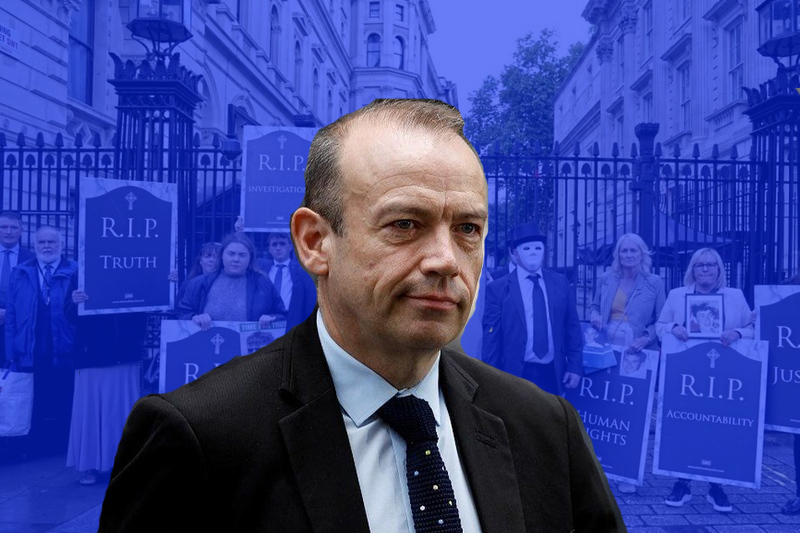
troubled legacy bill amendments were said to be ‘tinkering around the edge’
Changes made to a contentious bill intended to address the legacy of Northern Ireland’s troubled past have been criticized as little more than “tinkering around the edges”.
People accused of crimes committed during the Troubles could receive immunity under the Northern Ireland Troubles (Legacy and Reconciliation) Bill if they cooperate with the Independent Commission for Reconciliation and Information Recovery (ICRIR), a new truth-finding organisation.
Additionally, it would put a stop to any further civil cases or inquests involving fatalities from the conflict.
The House of Lords is currently in the report stage
The Independent Commission for Reconciliation and Information Recovery will take over full responsibility for handling legacy cases on May 1st, 2024, according to changes made public by Northern Ireland Secretary Chris Heaton-Harris on Thursday. This will “ensure a smooth transition” from criminal investigations and court proceedings for those cases.
Additionally, they include giving victims and their families the chance to submit personal impact statements, giving the ICRIR a new duty to secure information regarding determining the veracity of an applicant’s claim, and revoking immunity if a person is subsequently found guilty of terrorist offences.
The penalty for failing to cooperate with the ICRIR will rise from £1,000 to $5,000.
The amendments also include confirmation that the Commissioner for Investigations must abide by the Human Rights Act 1998 requirements, a requirement for the ICRIR to publish a statement outlining the methodology used for each review as part of its final report, and a requirement to create guidelines for judging requests for immunity.
Keep Reading
Nearly all political parties, the Irish government, and victim advocacy organisations are against the bill.
According to Mr. Heaton-Harris, “significant amendments that directly address a number of key concerns raised by interested parties” have been made.
“This includes amendments on the conduct of reviews, compliance with Convention Rights, the independence of the Commission, conditional immunity, and ongoing legal processes,” the speaker said.
We are still steadfastly committed to moving legislation forward so that the Independent Commission for Reconciliation and Information Recovery (ICRIR) can be established and start providing better outcomes for those who have been most negatively impacted by the Troubles as soon as possible.
Raymond McCord, a victim advocacy activist, claimed that the Government is only “tinkering around the edges” and that the only appropriate action would be tossing the Bill.
He called the legislation “disgraceful” and “disgusting,” accusing the government of “walking on the graves of our murdered family members,” and added that if the legislation is passed, the victims will consider taking legal action.
He has urged the political leaders in Northern Ireland to meet with the victims on Friday.
The Conservatives are trying to cover up the murders of our innocent family members during the Troubles, he said, adding that this is not about politics or sectarianism.
“We victims are fighting tooth and nail to put a stop to this; we demand action from every political figure in the nation.
Speaking is over-Stand with us as a unit.
The amendments, according to Amnesty International, “do nothing to address the fundamental flaws with the bill.”
No one is fooled by these changes, according to Grainne Teggart, deputy director of Amnesty International UK’s Northern Ireland office.
He claimed that the government was still clearly intent on denying victims their fundamental rights and moving forward with a bill that only suited its needs.
“The amendments come in response to the Committee of Ministers of the Council of Europe issuing a resolution expressing their grave concern regarding the bill’s compliance with the Government’s obligations under international human rights law.
It’s time for the Government to commit to a shared path forward to deal with the Troubles’ legacy that prioritises and protects victims rather than continuing to push this profoundly unjust bill through Parliament.
In response, Relatives for Justice NIO claimed that the changes “only make the situation worse.”
“Victims’ and survivors’ rights, particularly those involved in inquests, will be permanently curtailed. The Bill encourages state strategies that stall inquest proceedings, they claimed.
MP for Sinn Féin The amendments, according to Gerry Kelly, are “fundamentally flawed” and will “slam the door shut” on victims receiving due process.
He cited the backlog in disclosure by the PSNI and the lack of resources for this work in claiming that the proposed new deadline for wrapping up inquests of May 2024 will rob many families of this opportunity.
The expectation among families was that once inquests were opened, they would be concluded, so he called the amendment “particularly cruel.”
“Families will also not be granted access to legacy and Police Ombudsman investigations, which are also set to end on May 1 of the following year.
Instead, “these cases will be transferred to a new Commission, the ICRIR, whose powers will be limited to reviews rather than Article 2 investigations as required under human rights legislation.”
The passage of this Bill through both Houses is being hurried so that it can become law in six to seven weeks, just in time for the Parliament to break for the summer on July 26.
“It is a travesty, a perversion of the legal process, and with the objective of ending citizens’ rights to access due legal process.”
Prior to that, the Committee of Ministers of the Council of Europe in Strasbourg passed an interim resolution in which it “strongly reiterated” its calls for the UK to reevaluate the conditional immunity plan in light of concerns raised regarding its compliance with the European Convention on Human Rights.
Micheál Martin, the Tánaiste, praised the decision
My government regrets that the Legacy Bill is still moving forward in the legislative process without the help of Northern Ireland’s political parties, families, victim advocacy groups, or civil society, he said.
“I believe that, if enacted, the Bill would undermine rather than promote reconciliation because it grants amnesties for crimes that constitute egregious violations of human rights.”









